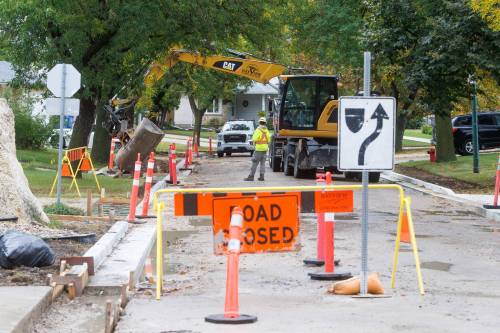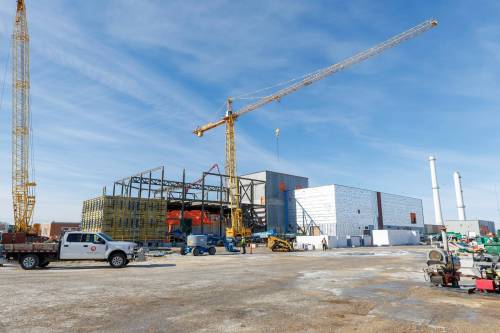Economics and Resources
Please review each article prior to use: grade-level applicability and curricular alignment might not be obvious from the headline alone.
First Nation says Hydro misuse of river diversion destroying sturgeon population
5 minute read Preview Thursday, Jan. 22, 2026Flexibility has become deal-breaker, not perk
6 minute read Preview Saturday, Jan. 17, 2026Damage estimates spiral as Pimicikamak tries to recover from power outage, deep freeze
7 minute read Preview Sunday, Jan. 4, 2026Northwest Territories facing a hard-as-diamonds reality as pivotal industry wanes
7 minute read Preview Friday, Jan. 2, 2026Hundreds evacuated amid power outage in Pimicikamak
6 minute read Preview Tuesday, Dec. 30, 2025Canada responsible for ensuring safe First Nations housing, Federal Court rules in $5-B class-action suit
3 minute read Preview Thursday, Dec. 11, 2025Churchill’s future has looked bright in the past, then politics dimmed the lights
5 minute read Preview Monday, Nov. 24, 2025First Nations sue over oil-rich land
4 minute read Preview Saturday, Nov. 22, 2025Canadians seeking ways to save on groceries as food costs remain top concern: survey
4 minute read Preview Friday, Nov. 21, 2025New trade deal to chop red tape, knock down trade barriers across Canada
4 minute read Preview Thursday, Nov. 20, 2025Doctor retention needs focus in year ahead
6 minute read Preview Tuesday, Nov. 18, 2025Encampment residents defiant as new policy takes effect
7 minute read Preview Tuesday, Nov. 18, 2025Twelve takeaways from the City of Winnipeg budget
5 minute read Preview Friday, Nov. 14, 2025Greenwashing rules to be scaled back, but scope of change remains unclear
5 minute read Preview Wednesday, Nov. 12, 2025Many Canadians preparing to cut back on holiday spending: survey
2 minute read Preview Wednesday, Nov. 12, 2025City tries to get the most bang for its (sewage) buck
4 minute read Preview Friday, Nov. 7, 2025Invention of combine part reaps recognition in Time
5 minute read Preview Saturday, Nov. 1, 2025It’s easy to take arts and culture for granted. Not because they don’t matter, but because they’re woven so deeply into our daily lives.
They’re in the stories we tell, the music in our earbuds, the festivals that bring neighbours into the streets and the murals that brighten our downtowns.
Arts and culture are part of who we are as Manitobans.
But the arts aren’t just “nice to have.” They’re essential. Especially right now.
First Nations accuse Hydro, province, feds of profiting from land
3 minute read Thursday, Oct. 30, 2025Two First Nations are suing Manitoba Hydro and the provincial and federal governments, claiming the institutions have made billions of dollars through hydroelectric operations on land the communities never agreed to cede.
In a statement of claim filed last week in the Court of King’s Bench, Canupawakpa Dakota Nation and Dakota Tipi First Nation in southern Manitoba are seeking damages for alleged infringement on their rights.
The court filing accuses the public utility, the province and the federal government of breaching duties owed to the Dakota nations and of unjustly enriching themselves at the expense of the communities, without consultation.
“The yearly revenue Manitoba Hydro produces from the land and particularly, the activities, is substantial,” reads the lawsuit.
The road not taken: lowest number of Manitobans in three decades cross border at Pembina in July, August
5 minute read Preview Wednesday, Oct. 29, 2025On second anniversary of Oct. 7 attacks and start of Gaza war, officers say rushing to cover painful vandalism reduces odds of arrests
8 minute read Preview Tuesday, Oct. 7, 2025Roasters and cafés grapple with rising coffee bean prices
4 minute read Preview Monday, Oct. 6, 2025Big things are ahead for northern Manitoba.
Political leaders at every level are focused on unlocking the North’s tremendous potential, and what sets this moment apart is the scale — which comes with the need for thoughtful planning that includes people, not just infrastructure, to help us realize the opportunity ahead.
Churchill could emerge as a vital Canadian port, with year-round shipping supported by icebreakers, an upgraded railway and all-weather roads connecting isolated communities. Upgrading Manitoba Hydro’s northern transmission system and investing in new projects like the Kivalliq Hydro-Fibre Link, would deliver clean energy and broadband—opening new possibilities for families and businesses across Northern Manitoba and Nunavut. Major mining initiatives are advancing and have been recognized as nationally significant.
These ambitious undertakings have the potential to transform Manitoba, benefiting all Manitobans — especially those in the North — with good, new jobs. Realizing this future will require people (thousands of them) —welders, carpenters, electricians and heavy-duty mechanics to build and maintain energy and transport systems; operators to construct roads; IT specialists and logisticians to run modern supply chains; and nurses, teachers and social workers to strengthen communities as they grow. With large-scale projects underway across Canada, competition for a skilled workforce will be fierce.
The simplest way to raise living standards? Build a better business climate.
Manitoba is a small, open economy. That should be freeing. It should mean we focus on what we do best, and trust the market to send signals about where investment belongs. But more often, government takes the wheel.
The record on that isn’t good. Governments like to believe they can allocate capital more efficiently than markets. History says otherwise. The “winners” chosen often reflect politics more than economics.
Tariffs are the clearest example. Drop a tariff, and one industry will feel the pain of new competition. But the benefits are spread out: lower prices for consumers, lower costs for businesses, higher productivity overall. Raise a tariff, and the reverse happens.




















